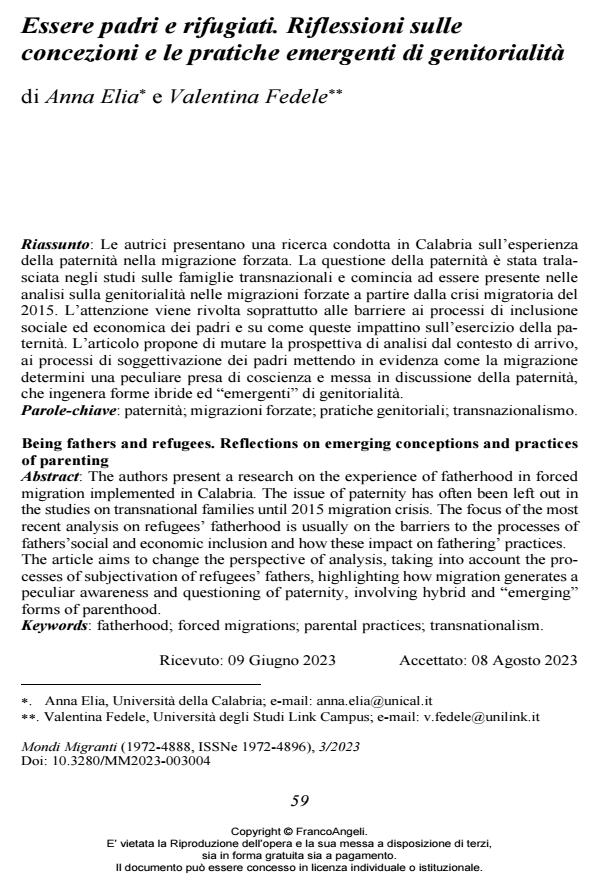Essere padri e rifugiati. Riflessioni sulle concezioni e le pratiche emergenti di genitorialità
Titolo Rivista MONDI MIGRANTI
Autori/Curatori Anna Elia, Valentina Fedele
Anno di pubblicazione 2023 Fascicolo 2023/3
Lingua Italiano Numero pagine 20 P. 59-78 Dimensione file 243 KB
DOI 10.3280/MM2023-003004
Il DOI è il codice a barre della proprietà intellettuale: per saperne di più
clicca qui
Qui sotto puoi vedere in anteprima la prima pagina di questo articolo.
Se questo articolo ti interessa, lo puoi acquistare (e scaricare in formato pdf) seguendo le facili indicazioni per acquistare il download credit. Acquista Download Credits per scaricare questo Articolo in formato PDF

FrancoAngeli è membro della Publishers International Linking Association, Inc (PILA), associazione indipendente e non profit per facilitare (attraverso i servizi tecnologici implementati da CrossRef.org) l’accesso degli studiosi ai contenuti digitali nelle pubblicazioni professionali e scientifiche.
Le autrici presentano una ricerca condotta in Calabria sull’esperienza della paternità nella migrazione forzata. La questione della paternità è stata trala-sciata negli studi sulle famiglie transnazionali e comincia ad essere presente nelle analisi sulla genitorialità nelle migrazioni forzate a partire dalla crisi mi-gratoria del 2015. L’attenzione viene rivolta soprattutto alle barriere ai pro-cessi di inclusione sociale ed economica dei padri e su come queste impattino sull’esercizio della paternità. L’articolo propone di mutare la prospettiva di analisi dal contesto di arrivo, ai processi di soggettivazione dei padri mettendo in evidenza come la migrazione determini una peculiare presa di coscienza e messa in discussione della paternità, che ingenera forme ibride ed “emergenti” di genitorialità.
Parole chiave:paternità; migrazioni forzate; pratiche genitoriali; transnazio-nalismo.
Anna Elia, Valentina Fedele, Essere padri e rifugiati. Riflessioni sulle concezioni e le pratiche emergenti di genitorialità in "MONDI MIGRANTI" 3/2023, pp 59-78, DOI: 10.3280/MM2023-003004